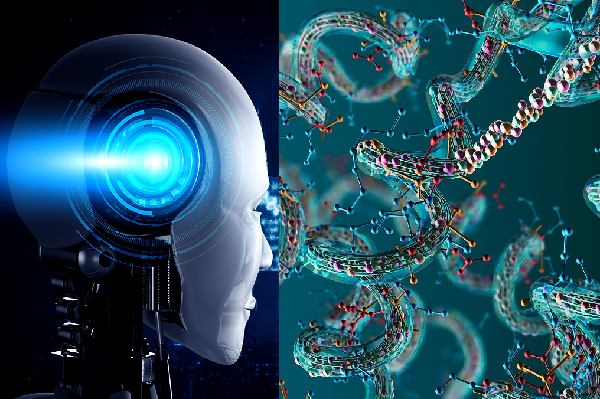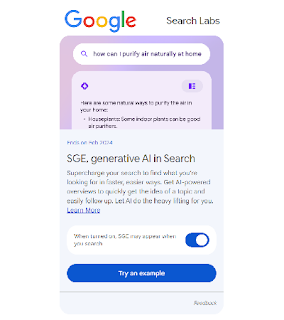How AI is Revolutionizing the Study of Biomolecules: Exploring the Future of Medicine
Discover how AI is revolutionizing the study of biomolecules and transforming the future of medicine. From personalized medicine to disease diagnosis, learn about the potential of AI in this in-depth article.
Artificial Intelligence (AI) has revolutionized the study of biomolecules, offering researchers new
tools to explore the complex structures and functions of biological systems.
With the ability to analyze vast amounts of data and identify patterns and
relationships, AI is transforming drug discovery, personalized medicine, and
disease diagnosis.
In this article, we will
explore the ways in which AI is revolutionizing the study of biomolecules and
the future implications for medicine.
AI in Drug Discovery
The process of
discovering and developing new drugs is a time-consuming and costly process
that can take up to 15 years and cost billions of dollars. However, the use of
artificial intelligence (AI) in drug discovery has the potential to
revolutionize this process, making it faster, more efficient, and more
cost-effective.
AI is being used in
various stages of drug discovery, including target identification, lead
discovery, lead optimization, and clinical trial design. By leveraging large
datasets and advanced algorithms, AI can help identify new drug targets,
predict the efficacy and safety of potential drug candidates, and optimize lead
compounds for better drug-like properties.
One of the key benefits
of AI in drug discovery is its ability to analyze vast amounts of data from
various sources, including electronic health records, genomics, proteomics, and
metabolomics data. This allows researchers to identify new drug targets, develop
new therapeutic approaches, and accelerate drug discovery.
AI can also help identify
novel compounds with drug-like properties. Traditional drug discovery methods
involve testing large numbers of compounds to identify potential leads.
However, this approach is time-consuming and expensive. AI-based approaches can
help identify novel compounds with drug-like properties by analyzing large
datasets and predicting their properties based on their chemical structure and
biological activity.
Furthermore, AI can also
help optimize lead compounds for better drug-like properties. This includes
predicting their pharmacokinetic properties, such as absorption, distribution,
metabolism, and excretion (ADME), as well as their toxicity and potential side
effects. This can help researchers identify lead compounds that are more likely
to succeed in clinical trials and reduce the risk of costly late-stage
failures.
AI can also help design
more efficient and effective clinical trials. By analyzing patient data, AI can
help identify patient subgroups that are more likely to respond to a particular
treatment, allowing for more targeted and personalized approaches to drug
development. Additionally, AI can help optimize clinical trial design by
predicting patient outcomes, identifying potential safety issues, and
identifying optimal dosing regimens.
Despite the many benefits
of AI in drug discovery, there are also some challenges and limitations to
consider. One of the biggest challenges is the quality and availability of data.
AI models rely on large datasets to train and validate their algorithms, and if
the data is incomplete or biased, it can lead to inaccurate predictions.
Another challenge is the
interpretability of AI models. Many AI models are black boxes, meaning that it
can be difficult to understand how they arrived at their predictions. This can
make it difficult for researchers to validate the results and gain insights
into the underlying biology.
Finally, there are
regulatory and ethical considerations to take into account when using AI in
drug discovery. Regulatory bodies such as the FDA require evidence of the
safety and efficacy of new drugs before they can be approved for use in humans.
Therefore, it is important to ensure that AI-based approaches are transparent,
reliable, and accurate.
In summary, AI has the
potential to revolutionize the drug discovery process by accelerating the
identification and optimization of novel drug candidates, and improving the
efficiency and effectiveness of clinical trials. While there are still
challenges and limitations to overcome, AI represents a significant opportunity
to transform the future of medicine and improve patient outcomes.
AI in Personalized Medicine
Personalized medicine
refers to the tailoring of medical treatment to the individual characteristics
of each patient. This approach takes into account an individual's genes,
lifestyle, and environment to develop personalized treatment plans. The goal is
to provide patients with the most effective treatment with the least possible
risk of side effects.
One of the key challenges
of personalized medicine is analyzing large amounts of data to identify
patterns that are relevant to patient outcomes. This is where AI comes in. AI
algorithms are trained on large datasets of patient information, including
genetic and medical data, to identify patterns and develop predictive models.
These models can then be used to develop personalized treatment plans that are
tailored to each patient's individual needs.
AI in Drug Development
AI is also revolutionizing
the drug development process by enabling researchers to identify potential drug
targets more quickly and accurately. Traditionally, drug discovery has been a
slow and costly process, involving the screening of thousands or even millions
of compounds to identify those that are effective against a particular disease.
AI can significantly
speed up this process by analyzing vast amounts of data to identify potential
drug targets more quickly and accurately. Machine learning algorithms can be
trained on large datasets of chemical compounds and their interactions with
biological targets to develop predictive models that can identify new drug
targets with a high degree of accuracy.
AI in Clinical Trials
AI is also being used to
optimize clinical trial design and improve patient recruitment. Clinical trials
are essential for testing the safety and efficacy of new treatments, but they
are also expensive and time-consuming.
AI can help to optimize
clinical trial design by predicting which patients are most likely to respond
to a particular treatment. This can help to improve patient recruitment and
reduce the time and cost of clinical trials.
AI in Medical Imaging
Medical imaging is
another area where AI is making a significant impact. AI algorithms can analyze
large datasets of medical images to identify patterns and anomalies that may be
missed by human radiologists.
This can help to improve
the accuracy of diagnoses and reduce the time and cost of medical imaging. AI
algorithms can also be used to develop predictive models that can identify
patients who are at risk of developing certain conditions based on their
medical images.
Challenges of AI in
Personalized Medicine
Despite the many benefits
of AI in personalized medicine, there are also significant challenges that must
be addressed. One of the biggest challenges is the need for high-quality data.
AI algorithms rely on large datasets of patient information to develop
predictive models, but this data must be accurate, complete, and representative
of the population being studied.
Another challenge is the
need for ethical and transparent use of AI in medicine. AI algorithms can have
biases and may not always be transparent in their decision-making processes. As
such, it is essential to ensure that AI is used in a fair and transparent
manner and that patients have access to the information and explanations they
need to make informed decisions about their care.
AI is revolutionizing the
field of personalized medicine, enabling researchers to analyze vast amounts of
data to develop personalized treatment plans that are tailored to each
patient's individual needs. AI is also being used to speed up the drug
development process, optimize clinical trial design, and improve medical
imaging accuracy. While there are challenges associated with the use of AI in
medicine, the potential benefits are significant and hold promise for the
future of healthcare.
AI in Disease Diagnosis
Disease diagnosis is one of
the most important applications of artificial intelligence (AI) in healthcare.
With AI, doctors and researchers can analyze large amounts of data to identify
patterns and make accurate diagnoses. This technology is transforming the field
of medicine and improving patient outcomes.
AI algorithms can analyze
a range of data, including medical images, genetic data, and patient records.
By analyzing this data, AI can detect patterns that might be too complex for
humans to identify. This can lead to earlier and more accurate diagnoses, which
can improve patient outcomes.
One area where AI is
making a significant impact is in the diagnosis of cancer. With AI algorithms,
doctors can analyze medical images such as MRI scans to detect small tumors
that might be missed by human observers. AI can also analyze genetic data to
identify mutations that are associated with a higher risk of developing certain
types of cancer.
In addition to cancer
diagnosis, AI is also being used to diagnose other diseases such as Alzheimer's,
Parkinson's, and heart disease. By analyzing patient data, AI algorithms can
identify patterns that might indicate the presence of these diseases before
symptoms appear. This can lead to earlier treatment and better patient
outcomes.
One of the key benefits
of AI in disease diagnosis is the ability to personalize treatment plans. By
analyzing patient data, AI algorithms can identify the most effective
treatments for individual patients. This can lead to more targeted and
effective treatments that can improve patient outcomes.
AI is also improving
disease diagnosis in areas with limited access to healthcare. In many parts of
the world, there is a shortage of trained medical professionals. AI algorithms
can help fill this gap by analyzing patient data remotely and providing accurate
diagnoses. This can improve access to healthcare and reduce the burden on
overworked medical professionals.
There are some challenges
associated with the use of AI in disease diagnosis. One of the main challenges
is the need for large amounts of high-quality data. AI algorithms rely on large
datasets to identify patterns and make accurate diagnoses. Without access to
high-quality data, AI algorithms may not be effective.
Another challenge is the
need for rigorous testing and validation of AI algorithms. It is essential to
ensure that AI algorithms are accurate and reliable before they are used in
clinical practice. This requires extensive testing and validation in controlled
environments.
Despite these challenges,
the potential benefits of AI in disease diagnosis are significant. With AI,
doctors and researchers can make more accurate diagnoses, personalize treatment
plans, and improve patient outcomes. As AI technology continues to evolve, it
is likely that it will become an increasingly important tool in the fight
against disease.
Future Implications
As AI continues to
revolutionize the study of biomolecules, it is clear that the field of medicine
is on the cusp of a major transformation. Here are some of the potential
implications of AI in the field of medicine:
Improved Accuracy in
Diagnosis: With AI-based systems,
the accuracy of diagnosis can be significantly improved. By analyzing vast
amounts of data and detecting patterns that humans may miss, AI can help
identify diseases in their early stages when they are more treatable.
More Effective
Treatments: AI can help develop more
effective treatments by identifying biomarkers and predicting how different
drugs will interact with the patient's specific genetic makeup. This can lead
to personalized treatment plans that are tailored to the individual patient's
needs.
Increased Efficiency: By automating many of the processes involved in drug
discovery and diagnosis, AI can greatly increase efficiency in the field of
medicine. This can lead to faster development of new drugs and more efficient
use of resources.
Enhanced Patient
Experience: AI can improve the
patient experience by providing more personalized care and reducing the
likelihood of errors or misdiagnosis. Patients can also benefit from more efficient
diagnosis and treatment, leading to better health outcomes.
New Frontiers in
Medicine: AI has the potential to
open up new frontiers in medicine, such as the development of artificial organs
or the ability to grow replacement tissues and organs. With AI's ability to
process vast amounts of data and simulate complex biological systems, the
possibilities for medical innovation are endless.
Conclusion
AI is revolutionizing the
study of biomolecules and has the potential to transform the field of medicine
as we know it. By leveraging the power of AI, we can improve accuracy in
diagnosis, develop more effective treatments, increase efficiency, enhance the
patient experience, and open up new frontiers in medicine. However, there are
also challenges to be addressed, including the need for large, high-quality
datasets of biomolecular data and ethical concerns around the use of AI in
medicine. As AI technology continues to evolve and improve, we can expect to
see even more exciting breakthroughs in the years to come.




Comments
Post a Comment